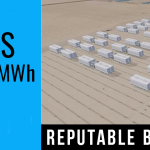
Federal Minister for Education Dan Tehan was on hand at the University of New South Wales (UNSW) last week to launch the ARC Research Hub alongside scientific and technological leaders. The world-class facility aims to develop energy storage technologies to aid the nation’s, and the world’s, transition to renewable energies through the overcoming of intermittency issues.
“What this Integrated Energy Storage Solutions Hub will embark on is absolutely vital to our nation’s future,” Tehan said. “If we are to transition our economy, then having the energy solutions to do it is absolutely vital because if we don’t, we won’t be able to transition in a way which takes all Australians with us.”
The Research Hub for Integrated Energy Storage Solutions is funded through the Australian Research Council’s Industrial Transformation Research Hubs Scheme, and led by Professor Joe Dong. The goal is to bring together experts across universities and industry to develop energy storage technologies solutions that can best capture surplus energy from renewables.
The Hub has quite a broad mandate, seeking to participate not only in areas of storage technology manufacturing but also integration, optimisation, management, life cycle assessment, and economic valuation.
In terms of batteries and supercapacitor technologies, research will be performed using vanadium, lithium-sulphur, iron-slurry and sodium-ion, and lithium-ion batteries, one focus area is a battery solution for extreme environments.
As for fuel cells, the Hub is looking to create novel and improved fuel cell technologies, specifically ammonia-based fuel cells that would better enable hydrogen export, a key part of the Australia’s National Hydrogen Strategy.
Power-to-gas falls into a similar and indeed interconnected basket, for research into advanced catalytic systems for power-to-gas conversion is looking to extend the capability of fuel cell technology to allow for direct input from renewable energies like solar PV.





